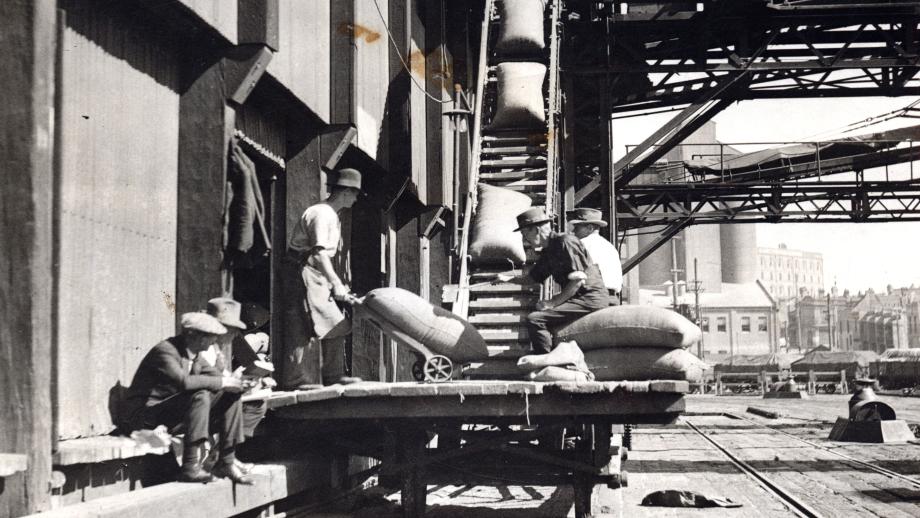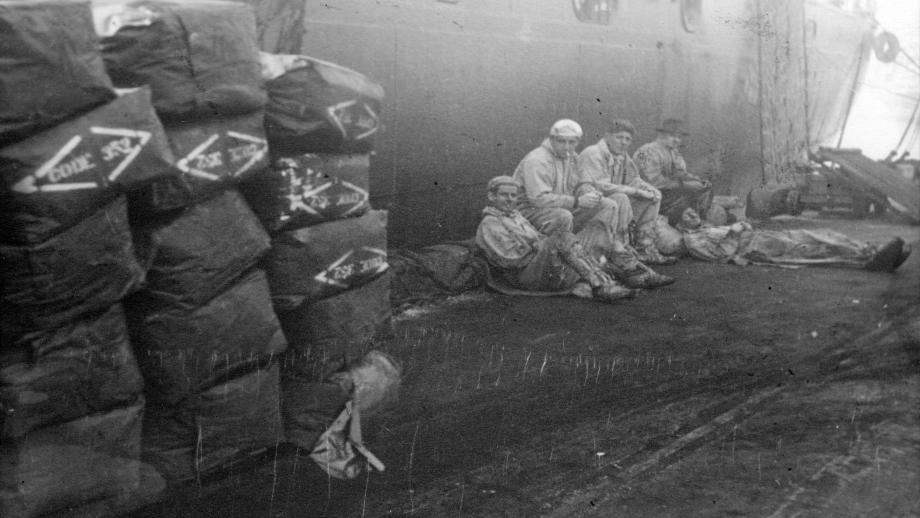For much of the 1920s, the Waterside Workers' Federation was focused on negotiating wages and conditions. However, by the late 1920s waterfront workers found themselves in an even worse situation.
In 1927, trouble was brewing in the Queensland branches in relation to overtime and the single pick-up rule. Depending on location, wharfies were hired on either a once or twice daily pick-up rule. The union argued that the twice-daily pick-up forced workers to wait all day in the hope of getting work during the second pick-up if not picked in the morning. Employers enforced the twice-daily pick-up, advising “complete observance of the existing Awards and Agreements was required and work would only be offered to Federation members on those conditions” (Healy n.d.).
Wharfies in some locations refused to attend any pick-ups, effectively striking. Even after the union recommended wharfies return to work, some refused, particularly those in Melbourne, which was one of the few ports that operated a single daily pick-up. In an effort to resolve the matter, the Australian Council of Trade Unions (ACTU) intervened. The Federation’s log of claims was heard by Judge Beeby, however a disagreement over the ACTU’s actions in relation to the pick-up rule led to the Federation’s Committee of Management calling upon all trades to withdraw their affiliation with the Trades and Labour Councils.
Judge Beeby heard evidence from branches across Australia before handing down his findings. While overtime rates were introduced, there was to be no wage increase and the unpopular twice-daily pick-up would remain. Beeby argued that the WWF Committee of Management sought to “secure greater control of waterside operations and to limit the selection of labour by foremen” (Healy n.d.).
A WWF conference following the decision voted by 60 votes to 11 to “repudiate entirely the pernicious and vicious Beeby Award” (Healy n.d.). However, ultimately the Federation knew that if it were to have any chance of negotiating a better deal, members would need to accept the new Award and at a delegates’ convention, representatives voted to accept a return to work under the Beeby Award by 48 votes to 22, with the push led by the Brisbane Branch. However, confusion reigned and a lack of clear leadership left members confused about the Federation’s position.
Against a backdrop of confusion following the ruling of Judge Beeby, the Bruce-Page Government took special steps to deal with the waterfront dispute, fining the WWF £1,000 and introducing an amendment to the Transport Workers Act to require every waterside worker to take out a licence to work. Officially known as the Transport Workers’ Act 1928, the union referred to this new legislation as the Dog Collar Act. The name came about in relation to the cost of a license, which was one shilling, the same price as a dog license at the time.
Adding to this was the replacement of a previous explicit preference for employers to hire union members over non-union workers (Australian Society for the Study of Labour History Melbourne Branch 1991). The changes meant that employers were now free to hire whomever they wished.
At the Maritime and Transport Conference in September 1928, there was conflict between branches in relation to acceptance of the Beeby Award and the new licencing system. The WWF Committee of Management directed all branches in the ports where the Transport Act operated to refuse to take out licences. For those that did take out licenses, union members were issued with a pink ticket, while non-union workers were issued with a brown ticket. Employers who wished to discriminate against WWF members could now easily recognise them by their pink tickets.
At ports across Australia, there were clashes between union members and non-union workers, many of whom were unemployed workers willing to undertake the work of union wharfies. In Melbourne, many of the non-union workers were recent migrants from Italy and Greece, which added a nasty element of racism to the confrontation. On 2 November 1928, a violent confrontation broke out at Melbourne’s Princes Pier, with unionists attempting to break through a police cordon that was protecting a ship using ‘scab labour’. In the scuffle, four trade unionists were wounded, including Alan Whittaker, who later died of his wounds.
References
Australian Society for the Study of Labour History Melbourne Branch 1991, ‘Ship to Shore: A History of Melbourne’s Waterfront and its Union’s Struggles’, Recorder, No. 166, <https://labourhistorymelbourne.org/wp-content/uploads/2020/06/Recorder-no.-166-February-1991.pdf>
Healy, J n.d., A Brief History of the Australian Waterfront and the Waterside Workers’ Unions, Waterside Workers’ Federation Sydney Branch Deposit (Z468).
On the Water: The Docks n.d., Old Treasury Building, <https://www.oldtreasurybuilding.org.au/lost-jobs/on-the-water/the-docks/>
Pyrmont History Group n.d., Waterside Workers, <https://pyrmonthistory.net.au/waterside-workers>









